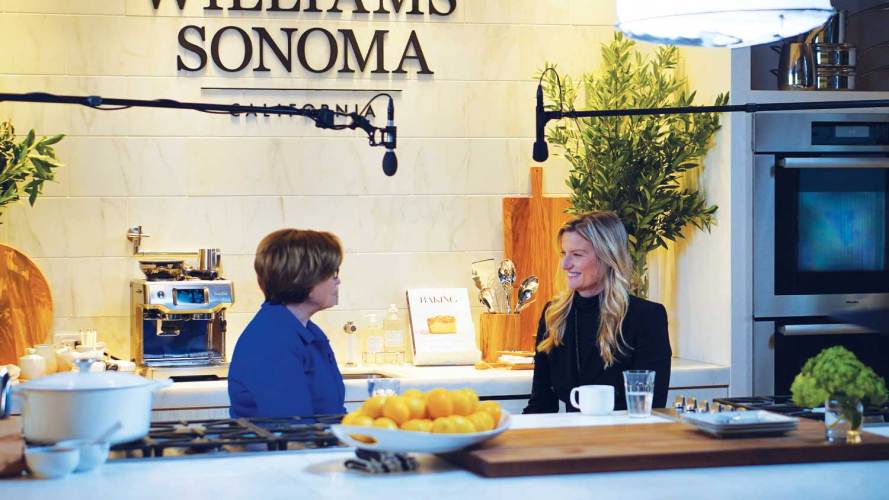CEO by 40: Behind Laura Alber’s Rise at Williams-Sonoma



When Williams-Sonoma CEO Laura Alber found unexpected strength and creativity, her career, her company, and her life changed forever.
Like many college graduates, Laura Alber was long on ambition but short on job prospects. She headed west to make it on her own. “Drove out, no connections, no money, in my Jeep, with my friends,” she told me in a recent episode of “The Inflection Point,” taped in Williams-Sonoma’s gorgeous test kitchen in its San Francisco headquarters.
What Alber did bring in her big move was a potent combination of design and business skills spurred by her semester abroad at the University of Edinburgh. She observed students donning big hats, capes, and other theatrical fashions. When she returned to college in Philadelphia, she churned out floppy velvet hats in between classes and sold them as fashionable novelties.
Listen to Williams-Sonoma’s CEO Laura Alber share her story
On “The Inflection Point” on Salesforce+, learn how her passion for food, family, and home helped her career thrive.



“I got one of those old antique trunks and printed up my order sheet at Kinko’s,” Alber said. “To get appointments and actually have them write orders? Thrilling.”
It wasn’t long before Alber found a job that would nurture her dual talents for design and sales. She became a decorative accessories buyer (think: vases, frames, and mirrors) for the Pottery Barn catalog.
But even as a junior employee, Alber would not settle for the bare minimum, pushing herself to challenge her own thinking and limitations.
“I remember physically going to the library to read about the history of furniture,” Alber recalled, noting she was determined to converse fluently with the company’s venerable senior roster. “Actually, it was fairly intimidating: They were architects, they were designers, they were artists, they were chefs. And so I felt like I had to figure this out.”
This tendency to test the status quo has become a hallmark of Alber’s. She has always been willing to challenge conventional wisdom and biases — including her own. One of those beliefs was that to succeed as a young woman in a competitive corporate culture, she couldn’t have kids. Then, as her career began to build up steam, her grandfather died, and her perspective shifted. “The minute that happened, and he had passed, I said, ‘Let’s have a baby.’”
Suddenly, Alber faced judgment from colleagues. Senior executives worried that she would lose her focus to “pregnancy brain.”
But she noticed something else — a surge in mental ingenuity and physical stamina that spurred one of the company’s most successful and cherished brands: Pottery Barn Kids.
“In my entire career, being pregnant was the time I was most creative,” Alber said. “I had so much energy, I could practically lift the car.”
It was during this time — the year was 1998 — that Alber wrote up the business plan for Pottery Barn Kids, recruiting a handful of other women from the Williams-Sonoma parent company, many of whom were pregnant themselves, to help her get the new business off the ground.
Alber and her team prototyped the concept in the Williams-Sonoma parking garage, where they set up a clean-lined display of lamps, bedding, a rug, and curtains in four simple but elegant colors — a contrast from the fussy aesthetic that dominated children’s bedrooms in the preceding decades.
“Come downstairs, please. I want to show you something,” Alber remembered telling W. Howard Lester, the longtime CEO of Williams-Sonoma. “He was like, ‘Uh, what are you doing?’ And he walked in and goes, ‘Launch a catalog.’”
Pottery Barn Kids soon became the company’s most successful launch, and more than 20 years later, it leads the way in trendsetting children’s furnishings online and in more than 90 stores in the United States and abroad.
Perhaps one reason Alber remembers this interaction with Lester so well, aside from the obvious success it engendered, is that Alber has his old job. She became CEO of Williams-Sonoma in 2010, at 40 years old.
“People say to me, ‘How’d you become CEO?’ I actually really think that it was that entrepreneurship and that business success and that courage that got people’s attention,” Alber said. She credits her fast rise in the company not to being ambitious or strategic, but to staying grounded and in the moment.
“If you do a great job and you own it, people notice,” Alber said. “If you’re always just thinking about the next step, you can find yourself really disappointed.”
These days, Alber is cooking up a sequel to her formative Pottery Barn Kids moment. In our conversation for “The Inflection Point,” I came to understand why this CEO has become a darling of Wall Street as well as a tastemaker for Main Street. Alber continues to push for innovations across the business that will likely define the brand for generations to come.
One of them is her success in the digital space: 70% of the company’s direct-to-consumer business happens online. But Alber is perhaps more careful about digital transformation than some of her peers, many of whom are rushing to digital and hoping for a business growth panacea. Instead, Alber said that Williams-Sonoma is digital first — but not digital only.
“I think going to a store is the experience. The smell, the people, the help, some trusted expert who can help you decorate your home,” Alber said. She distinguishes her business from fashion retail, in which ecommerce returns are quick and easy and the decisions about what to buy tend to have lower stakes.
Another tenure-defining chapter for Alber was how the company handled the coronavirus pandemic. Alber was originally so concerned about the potentially ravaging effects of the pandemic on the business that she had her finance team project a year for Williams-Sonoma with zero revenue. That’s how dire things felt in the earliest uncertain months of the pandemic.
But then something amazing happened: Revenues didn’t bottom out as she’d feared. Instead, in-store employees quickly transitioned from helping customers in person to helping them over the phone and through digital chat functions. Alber believes it was those employees, empowered to shift tactics and reach customers in new ways, that helped the business weather the pandemic.
“I actually think you have to hire entrepreneurial people,” Alber said. “I think it’s the people who just wake up in the morning and think about the world that way — and we happen to have a lot of them working for us.”
This article originally appeared in Vantage Point, a Salesforce magazine




























